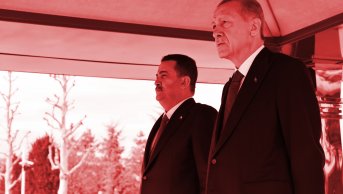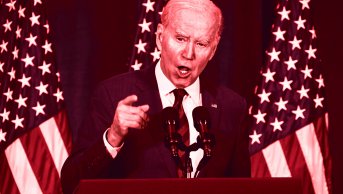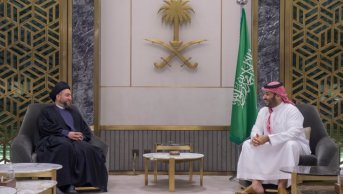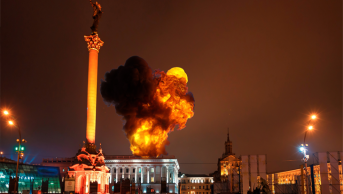Situation in Mosul after Its Eastern Part Has Been Liberated

Haydar al-Abadi, Iraqi Prime Minister, announced on 24 January 2017 that the eastern side of Mosul was completely cleared from DAESH. The Iraqi security forces, especially the Anti-Terrorism Force, have conducted a very difficult and tough battle to retake the eastern part of Mosul from the terrorist organization DAESH. The greatest challenge the Iraqi security forces faced in this war has been the use of civilians by DAESH as human shields. The Iraqi security forces have demonstrated a great ability and skill, even though DAESH tried to hinder their progress by using civilians. For this reason, civilian casualties are at low level in the neighbourhoods liberated from DAESH. At the same time, the Iraqi security forces have managed to open safe corridors to the families in the beleaguered neighbourhoods during the conflict. We can summarize the military situation on the 15th day after the eastern part of Mosul was totally liberated as follows: The Iraqi security forces and auxiliary forces wait for the command of the Chief Commander (Prime Minister), which is known to be given very soon, to rescue the western side of Mosul from DAESH. The Iraqi security forces aim to isolate DAESH by hitting places on the western part of the city under its control by air and artillery fire, and to make the terrorist organization lose its war ability and demoralized. On the other hand, the spokesperson of Hashd al-Shaabi Ahmad al-Assadi explained that the Hashd will play a significant role in the war to take place in the western part of Mosul.
Although there are many possible scenarios and assumptions about the war on the western part of Mosul, two main possibilities come to the forefront. The first is that retaking the control of the western part of Mosul from DAESH will take less time if the operation is launched from the east. This view is based on the following data:
- DAESH members have suffered from a decreased capability to continue this war and lower morale to a great extent in the conflicts taking place in the eastern part.
- The war methods of DAESH have lost all their mysteries. The war tactics of DAESH have been explored by the Iraqi security forces. Therefore, there is nothing new to be encountered by the Iraqi forces.
- DAESH has lost its strategic depth, manoeuvrability and logistic support. Since, for the battle in the east, the western part stood as the point of strategic depth, logistical support and manoeuvre.
- The western part is relatively smaller as an area compared to the eastern part. However, Tel Afar is the exception as the district is not considered to be in the western part of Mosul.
The second option concerning the conflicts in the western part of Mosul is that the conflicts in the western part prove to be relatively harder and last longer than the ones in the eastern part. The given possibility is based on the following reasons:
- DAESH, terrorist organization, may have reserved an elite fighting force to be used in the conflicts in the western part of Mosul.
- DAESH forces in the western part of Mosul will oppose the operation targeting this part more strongly compared to those in the east. Since the struggle here against DAESH will be the final battle, this can be called the courage of despair.
- The western neighbourhoods consist of both old houses and small and narrow streets. This situation is likely to give the Iraqi security forces greater difficulties compared to the eastern part.
- The number of civilians in the western part is higher than the number in the eastern part because people living in the western part could not get the opportunity to migrate and have continued to live in the neighbourhoods under the control of DAESH.
One mere inference can be made from these two possibilities: The Iraqi armed forces will take back the western part of Mosul from DAESH at any cost. Indeed, Ján Kubiš, United Nations Special Representative for Iraq, made a statement in the UN Security Council session on February 2, 2017, and stated that "the days of DAESH are counted in Iraq."
The destruction that Mosul experienced due to the air strikes conducted to save the eastern part of the city and due to destructive exercises of DAESH on the infrastructure, public services and properties of the civilians faced its horrible face. The Governorate of Nineveh and authorities for public services have been so helpless before this situation in such an overwhelming and frustrating manner. The efforts to satisfy public needs and getting rid of problems of the people in the eastern part of Mosul proved to be insufficient, especially regarding the provision of main services (water, electricity, heating, fuel, health services). At the same time, just after the eastern part of Mosul was liberated, lack of coordination and lack of mutual support were clearly seen between the Iraqi central government and the local government in Mosul in order to fulfil demands of the civilians and to solve their problems. Long-term strategic vision and plans must have been prepared by the central government for the reconstruction and improvement of infrastructure of the eastern and western parts of Mosul, in general, the province of Nineveh. However, it is necessary to wait until Mosul is completely cleared from DAESH for the implementation of all these plans. Major deficiencies have also been seen in the short-term contingency plans prepared in order to meet the main needs of the people after the eastern part of Mosul has been liberated. In other words, it is also possible to mention that there exist no such plans. As well as fighting against DAESH, the Iraqi military units both provided first aid supplies and medical care materials that the civilians needed in the liberated areas and distributed food and watersince the public buildings that provided these services have completely disappeared from the scene.
The weakness of the local governments for providing services to the people is seen not only in Mosul but in all of the provinces in Iraq. The main reason for this problem is the quota system implemented since 2003 in the formation of provincial assemblies and local governments. In this system, people in local government are appointed not thanks to their talents but due to political parties and sectarian groups which they are member of or to tribal support they have. This results in lack of necessary skills and experience for many authorities. On the other hand, people appointed in local governments think that they do not need necessary skills and experience. For, when they are appointed to these posts by their parties, sectarian groups or tribes, they have no doubt that these forces will protect them if they ever make a mistake.
Honestly, some state institutions in Mosul, especially the educational institutions and the university, have started to serve successfully after the eastern part has been liberated from DAESH. In line with these services, immediate instructions have been given in order to carry out procedures of students, staff and teachers. Besides, secure locations have been set up to carry out registration and similar bureaucratic tasks.
During a meeting with the local government of Zikar on the occasion of his visit to the Provincial Assembly of Zikar on February 1, 2017, Ammar al-Hakim, President of the National Iraqi Alliance, said: "In difficult circumstances the country has been going through, the National Alliance will not give you any promise. The Alliance only wants to consolidate its credibility. The opportunities to be offered by Iraq have been weakened due to the war and its resources have been exhausted ". Looking at the statement made by the leader of the political coalition which the Iraqi prime minister is a member of, it seems that the central government makes a pre-emptive apology as it cannot meet the needs of the stable middle and southern cities. However, while the central government has difficulty in providing services to the more stable regions which have respectively better conditions compared to the other regions, what will it do for the cities (Diyala, Saladin, Anbar, Nineveh) the general and special property assets of which have been severely devastated due to the war?
Another point that needs to be emphasized on the basis of the above mentioned information is the psychological state of the people of Mosul who either live under the control of DAESH or in the regions liberated from DAESH or who fled to the other provinces of Iraq or neighbouring countries due to the prevailing conflicts. Considering that their own city has been ruined, the services are almost totally gone, the central government cannot do anything, and the political forces could not reach a consensus on the ruling of Mosul after DAESH, the whole picture can easily engender and did already to a great extentfear and psychological pressure on citizens. This may prompt people to leave Mosul again and seek for safe places inside or outside Iraq, and other people will settle in the abandoned places. This event will probably bring about a demographic change in the city. Therefore, confidence-building messages and signals of hope need to be delivered to Muslim families. Significant steps must be taken in order to attach the people of Mosul to their city and to make them stay there. The following steps can be suggested regarding this issue:
- Exemption of Mosul from the provincial assembly elections scheduled to be held in September, 2017 and putting the election in Mosul over to another date. If the provincial assembly elections are not postponed in Mosul, the political forces and the local government will not be interested in rebuilding the city and resolving the problems of the people as they will make all efforts to figure out how to win the elections and to receive votes. As in each election in Iraq, Mosul will face competition and conflict instead of reconstruction.
- There exists a need to form a high commission consisting of members who are not members of any political party and are known due to their honesty in order to rebuild Mosul and coordinate the budget collected for this purpose from inside and outside Iraq.
- For reconstruction of the province of Mosul, zoning and maintenance teams from all provinces of Iraq should be gathered and sent to Mosul within the framework of a national campaign.
- Voluntary initiatives should be backed up and non-governmental organizations should be motivated. In Mosul, for example, campaigns such as the one launched by young people to clean neighbourhoods may be provided with sufficient support since such campaigns are significant to restore confidence among the Mosul society.
- Intense diplomatic efforts should be made in order to establish a regional and international coalition -such as the Marshall Plan for the reconstruction of Europe after the Second World War- for reconstruction of the regions destroyed by the war against DAESH. This situation exceeds the power of the central government. Crucial steps should be taken particularly concerning the strategic infrastructure services such as bridges, main roads, universities, hospitals, and water and electricity facilities. Of course, in order to put this proposal into practice, it is necessary to reach a political consensus between the Iraqi government and the neighbouring countries and international powers, and to create a suitable environment. At the same time, it would be appropriate for Iraq to make great efforts in its foreign policy to turn its disputes with the neighbouring countries into cooperation. In this regard, the Iraqi government should offer investment, economy and strategic partnership to them. Iraq can encourage its neighbouring countries to join the reconstruction efforts of Iraq at the international level. To create a secure and stable environment for regional and international efforts, the Iraqi government can pioneer the creation of new mechanisms for cooperation and coordination in the field of international security with the neighbouring countries and the active forces in the region.








